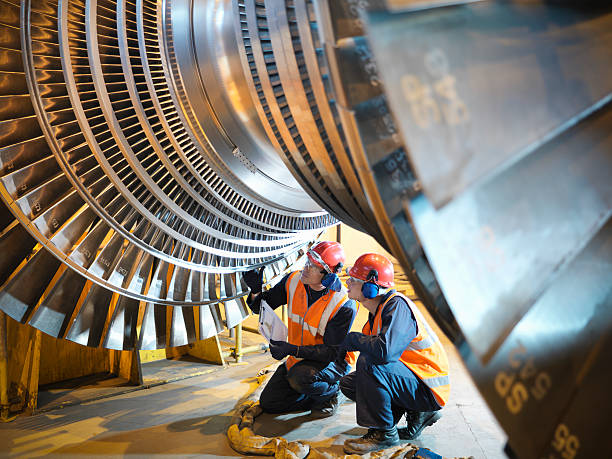How many jobs are available in industrial machinery components? The industrial machinery components industry is a vital sector that produces and supplies various mechanical parts and tools used in various manufacturing processes.
This industry is responsible for ensuring that machinery and equipment function effectively, which is essential for the production of goods and services.
As a result, there is a growing demand for skilled professionals who can design, manufacture, and maintain industrial machinery components.
In this context, the availability of jobs in the industrial machinery components industry has become an essential concern for job seekers and those interested in the field.
This article aims to explore the current job market for industrial machinery components and provide insights into the different factors that affect the availability of jobs in this sector.
We will also examine the qualifications and skills required for these jobs, the various job roles available, and the potential growth and career prospects in the field.
Also Read:
How Many Jobs Are Available in Major Pharmaceuticals?
How Many Jobs Are Available in Consumer Services?
How Many Jobs Are Available in Industrial Machinery Components?
The industrial machinery components industry offers numerous job opportunities for professionals with diverse skill sets and qualifications.
The exact number of jobs available in this sector varies depending on various factors such as market trends, technological advancements, and economic conditions.
However, overall, the industry continues to experience steady growth, leading to an increasing demand for skilled professionals.
Some of the common job roles in the industry include mechanical engineers, technicians, machinists, designers, and project managers.
The availability of jobs in industrial machinery components is likely to continue growing due to the expansion of manufacturing and industrial sectors.
Additionally, with the increasing emphasis on automation and advanced technology, there will be a growing need for experts who can design and maintain sophisticated machinery and equipment.
The Importance of Industrial Machinery Components
Industrial machinery components are essential to the manufacturing and production processes of various goods and services.
These components are used in machinery and equipment, such as conveyors, turbines, pumps, and generators, that power factories and other industrial processes.
Industrial machinery components help to ensure the accuracy, efficiency, and safety of industrial operations, which ultimately impacts the quality of the products produced.
The development of industrial machinery components has also led to advancements in automation and production processes, allowing for greater precision, speed, and cost savings.
Without these components, many industries would not be able to operate, making them a critical component of the global economy.
Factors Affecting the Availability of Jobs in Industrial Machinery Components
The availability of jobs in industrial machinery components is influenced by several factors.
Technological advancements and changes in manufacturing processes can lead to shifts in the demand for certain skills and expertise.
Economic conditions such as recessions or fluctuations in the industry can also impact the number of available jobs.
The availability of funding and investment for research and development also plays a role in creating job opportunities.
Education and training programs that provide the necessary skills and qualifications required for jobs in the industry can also affect the supply of qualified candidates.
Additionally, factors such as competition, globalization, and regulations can impact the availability of jobs in the industrial machinery components sector.
Job Market Trends in Industrial Machinery Components
The job market for industrial machinery components is dynamic and subject to various trends.
One significant trend in recent years is the increasing adoption of automation and advanced manufacturing technologies.
This trend has led to a growing demand for professionals with expertise in robotics, artificial intelligence, and machine learning.
Another trend is the integration of sustainability and eco-friendliness in manufacturing processes, leading to an increase in demand for professionals with experience in sustainable design and green technology.
The aging workforce is also expected to impact the job market as experienced workers retire, creating opportunities for new graduates and young professionals to enter the field.
The job market trends in industrial machinery components highlight the importance of staying up to date with emerging technologies and skills to remain competitive in the industry.
Qualifications and Skills Required for Jobs in Industrial Machinery Components
Jobs in industrial machinery components require a combination of technical, analytical, and problem-solving skills.
Educational requirements typically include a degree in mechanical engineering, electrical engineering, or a related field.
In addition, specific skills such as proficiency in computer-aided design (CAD) software, knowledge of materials science, and experience in manufacturing processes are essential.
Strong communication skills and the ability to work collaboratively in a team environment are also important.
Furthermore, a working knowledge of safety standards and regulations in the industry is critical to ensure the safe operation of machinery and equipment.
Keeping up with the latest technologies and industry trends is also important to remain competitive and advance in the field.
Job Roles and Responsibilities in Industrial Machinery Components
Job roles in industrial machinery components vary depending on the specific area of expertise and industry sector.
Some common job roles in the industry include mechanical engineers, technicians, machinists, designers, and project managers.
Mechanical engineers design and develop machinery and equipment, while technicians and machinists are responsible for the assembly and maintenance of the equipment.
Designers create 2D and 3D models using CAD software, and project managers oversee the implementation of projects from conception to completion.
Other responsibilities include analyzing data, conducting tests and experiments, troubleshooting issues, and ensuring compliance with safety and environmental regulations.
Effective communication, collaboration, and attention to detail are critical to success in these roles.
Salary Range and Benefits in Industrial Machinery Components
The salary range in industrial machinery components varies depending on job role, industry sector, and location.
Entry-level positions such as technicians and machinists typically earn between $30,000 to $40,000 annually, while mid-level positions such as mechanical engineers and designers can earn between $60,000 to $100,000 or more.
Senior-level positions such as project managers or executives can earn six-figure salaries.
Benefits packages may include health insurance, retirement plans, paid time off, and bonuses.
Some companies also offer training and development programs to help employees advance in their careers.
Overall, the salary range and benefits in industrial machinery components are competitive, making it a promising field for job seekers.
Also Read:
How Many Jobs Are Available in Real Estate Investment Trusts?
What Do Public Utilities Jobs Pay?
Conclusion
In conclusion, the industrial machinery components industry provides a wide range of job opportunities for professionals with diverse skill sets and qualifications.
While the exact number of jobs available varies depending on several factors such as market trends, technological advancements, and economic conditions, the industry is experiencing steady growth.
The increasing emphasis on automation and advanced technology is driving demand for skilled professionals who can design, build and maintain sophisticated machinery and equipment.
Additionally, the integration of sustainability and eco-friendliness in manufacturing processes is creating new opportunities for professionals with experience in sustainable design and green technology.
Overall, the availability of jobs in industrial machinery components is likely to continue growing, making it a promising field for job seekers.






